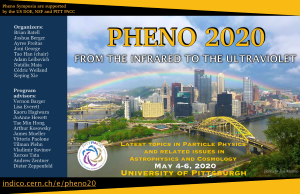Speaker
Description
In this talk I will introduce a new paradigm for the thermal production of dark matter in the early Universe, in which dark-matter particles acquire their mass and freeze out spontaneously from the thermal bath after a dark phase transition takes place. The decoupling arises because the dark-matter particles become suddenly nonrelativistic and not because of any decay channel becoming kinematically close. We propose a minimal scenario in which a scalar and a fermionic dark matter are in thermal equilibrium with the standard-model bath. We compute the finite temperature corrections to the scalar potential and identify a region of the parameter space where the fermionic dark-matter mass spontaneously jumps over the temperature when the dark phase transition happens. We explore the phenomenological implications of such a model in simple cases and show that the annihilation cross section of dark-matter particles has to be larger by more than 1 order of magnitude as compared to the usual constant-mass weakly interacting massive particle scenario in order to accommodate the correct relic abundance. We show that in the spontaneous freeze out regime a TeV-scale fermionic dark matter that annihilates into leptons through s-wave processes can be accessible to detection in the near future.




